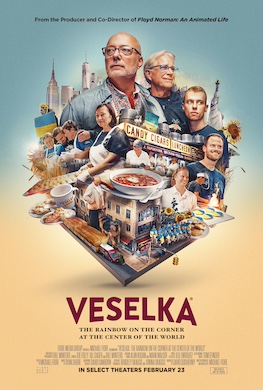New Documentary Is a Valentine to a Long-Standing, Much-Beloved Ukrainian Outpost at Manhattan
Michael Fiore’s ‘Veselka: The Rainbow on the Corner at the Center of the World’ is a story about emigres, family, and the repercussions of world events.

Before beginning this review of the new documentary by Michael Fiore, “Veselka: The Rainbow on the Corner at the Center of the World,” let me give a virtual high-five to the third-generation owner of the venerated Lower East Side eatery name-checked in the title, Jason Birchard.
Toward the beginning of the film, we watch Mr. Birchard standing outside his restaurant on Second Avenue. Seeing a bicycle delivery man barreling down the sidewalk, Mr. Birchard steps in front of him, iterating that “it’s a sidewalk. A sidewalk. That means you walk on the sidewalk. Bike is in the bike [lane].” The bicyclist, mumbling something or the other, decamps and walks his vehicle.
There are few things that can bond strangers more than a shared pet peeve. In strong-arming the social grace of pedestrian passage, Mr. Birchard emerges as a hero. Has the city been keeping tabs on just how many accidents or, God forbid, fatalities have been caused by those who insist on using sidewalks as their own personal autobahns? It’s enough to make a concerned citizen write a letter to the Mayor’s office….
Then again, given how Mayor Eric Adams comes off in “The Rainbow on the Corner at the Center of the World,” a concerned citizen might think twice about doing so. After being invited to break bread — or, rather, sip borscht — with members of the Ukrainian community, the mayor can hardly concentrate on the issue under discussion: the Russian war on Ukraine.
As the Ukrainian consul general to New York, Oleksii Holubov, attempts to garner political recognition for the plight of his country, the mayor is distracted: He’s too busy acknowledging wellwishers who have gathered on the pavement directly outside the windows of Veselka. As Mr. Holubov speaks of atrocities, our mayor mugs for the crowd. The resulting frustration on behalf of Messrs. Holubov and Brichard is plain to see.

It took the arrival of the Ukrainian national baseball team for the mayor to ascend the steps of City Hall and extol “the resiliency of what it is to continue to push forward in spite of all that you are facing.” The players have arrived in New York City for a two-game charity event to help keep Ukraine in the forefront of the news cycle. Mr. Birchard and his staff, a significant number of whom have Ukrainian roots, treat them to a home-cooked meal.
The turn-out for the game at Maimonides Park in Brooklyn is disappointing — the crowds are sparse and, ultimately, the Ukrainians lose to the NYPD team. Mr. Birchard is philosophical, eager to believe that this effort will instill hope for the players as well as for his staff. Chief among those in need of boosting is Veslkeka’s operations manager, Vitalii. He’s worried about the fate of his mother and grandmother in Ukraine; his behavior is understandably withdrawn.
“Rainbow on the Corner of the Center of the World” is a story about emigres, family, and the repercussions of world events. Wolodymyr Darmochwal, born in a small town called Bolekhiv, left Ukraine in the late 1940s to escape Russian oppression. Darmochwal came to New York City and opened a corner candy store in the center of Manhattan’s Little Ukraine, dubbing it the Ukrainian word for “rainbow,” “Veselka.”
Darmochal’s non-Ukrainian son-in-law, Tom Birchard, dropped out of college in 1966 to help out at the restaurant on what was intended to be a temporary basis. This self-assigned “holding pattern” lasted 54 years; now his son Jason oversees operations. And so the story unfolds: through expansion of the premises and the menu; the punk rock scene and its unexpected benefits; the aftermath of 9/11, Covid, and, now, war.
Is it necessary to hurl critical brickbats at what is a valentine to a long-standing and much-beloved ethnic outpost? Cavils about a soundtrack heavy with David Sanborn’s saxophone or Mr. Fiore’s lack of a firm editorial hand are mitigated by the gemütlichkeit of the Birchard family and the generosity they extend to their staff, their diners, and, through their charitable efforts, the citizens of Ukraine.
If Mr. Fiore’s picture isn’t as delicious as a night out at Veselka’s, then it’s at least certain to warm the cockles of even the sternest of cineaste hearts.

